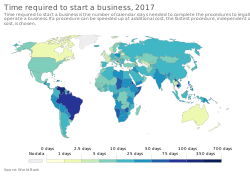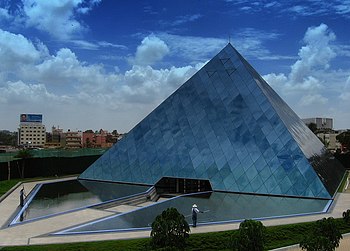Portal:Business
The Business and Economics Portal Business is the practice of making one's living or making money by producing or buying and selling products (such as goods and services). It is also "any activity or enterprise entered into for profit." A business entity is not necessarily separate from the owner and the creditors can hold the owner liable for debts the business has acquired. The taxation system for businesses is different from that of the corporates. A business structure does not allow for corporate tax rates. The proprietor is personally taxed on all income from the business. A distinction is made in law and public offices between the term business and a company such as a corporation or cooperative. Colloquially, the terms are used interchangeably. (Full article...) Economics (/ˌɛkəˈnɒmɪks, ˌiːkə-/) is a social science that studies the production, distribution, and consumption of goods and services. Economics focuses on the behaviour and interactions of economic agents and how economies work. Microeconomics analyses what is viewed as basic elements within economies, including individual agents and markets, their interactions, and the outcomes of interactions. Individual agents may include, for example, households, firms, buyers, and sellers. Macroeconomics analyses economies as systems where production, distribution, consumption, savings, and investment expenditure interact, and factors affecting it: factors of production, such as labour, capital, land, and enterprise, inflation, economic growth, and public policies that have impact on these elements. It also seeks to analyse and describe the global economy. (Full article...) Selected articleThe General Theory of Employment, Interest and Money was written by the British economist John Maynard Keynes. Although The General Theory was written in the aftermath of the Great Depression and was taken by many to justify the assumption by government of the responsibility for the achievement and maintenance of full employment, it is for the most part a highly abstract work of theory and by no means a tract on policy. Its full meaning and significance continues to be debated even today. As a book, it is a difficult read for a modern student of economics, although it is enlivened by some brilliant rhetorical passages, including the description of the stock market in Chapter 12 and the concluding chapter 24 on the (rather tentative) policy implications Keynes derived from his theory. Selected image
Selected economyThe United Kingdom has a highly developed social market economy. It is the sixth-largest national economy in the world measured by nominal gross domestic product (GDP), tenth-largest by purchasing power parity (PPP), and twentieth by nominal GDP per capita, constituting 3.1% of nominal world GDP. The United Kingdom constituted 2.17% of world GDP by purchasing power parity (PPP) in 2024 estimates. The United Kingdom has one of the most globalised economies and comprises England, Scotland, Wales and Northern Ireland. In 2022, the United Kingdom was the fifth-largest exporter in the world and the fourth-largest importer. It also had the fourth-largest outward foreign direct investment, and the fifteenth-largest inward foreign direct investment. In 2022, the United Kingdom's trade with the European Union accounted for 42% of the country's exports and 48% of its imports. The United Kingdom has a highly efficient and strong social security system, which comprises roughly 24.5% of GDP. (Full article...) Selected quoteThe majority of these men beheve that the fundamental interests of employees and employers are necessarily antagonistic. Scientific management, on the contrary, has for its very foundation the firm conviction that the true interests of the two are one and the same; that prosperity for the employer cannot exist through a long term of years unless it is accompanied by prosperity for the employe, and vice versa; and that it is possible to give the workman what he most wants — high wages — and the employer what he wants — a low labor cost — for his manufactures. It is hoped that some at least of those who do not sympathize with each of these objects may be led to modify their views; that some employers, whose attitude toward their workmen has been that of trying to get the largest amount of work out of them for the smallest possible wages, may be led to see that a more liberal policy toward their men will pay them better; and that some of those workmen who begrudge a fair and even a large profit to their employers, and who feel that all of the fruits of their labor should belong to them, and that those for whom they work and the capital invested in the business are entitled to little or nothing, may be led to modify these views. No one can be found who will deny that in the case of any single individual the greatest prosperity can exist only when that individual has reached his highest state of efficiency; that is, when he is turning out his largest daily output.
TopicsRelated WikiProjectsDid you know (auto-generated) -
On this day in business history
General imagesThe following are images from various business-related articles on Wikipedia.
More did you know
Business news
SubcategoriesRelated portals
Things you can doUrgent and important articles are bold
WikimediaThe following Wikimedia Foundation sister projects provide more on this subject:
SourcesDiscover Wikipedia using portals |







































